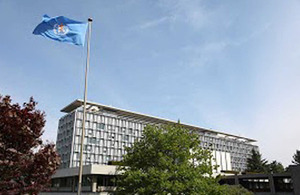Statement by UK Public Health Minister on the first day of the 68th Session of the World Health Assembly, Geneva, 18 May 2015
UK Public Health Minister, Jane Ellison MP, calls on WHO and the international community to respond more rapidly and effectively to public health emergencies.

The World Health Organisation in Geneva
President, Director-General Chan, honourable ministers, distinguished delegates.
I wish to thank the Director-General for her statement, and to align ourselves with the statement made by Latvia on behalf of the European Union and its Member States.
The Ebola outbreak and the devastating earthquake in Nepal have shown us the need for a resilient global health system that is able to deal with health and humanitarian crises.
The interim report on the Ebola crisis points the way forward and we encourage Member States to support the Director-General to take the necessary action to reform the WHO so it can better tackle these global health emergencies.
Together, we must act now to implement some key reforms:
- Firstly, to establish the Global Health Emergency Workforce.
- Secondly, to create an Emergency Contingency Fund, to which the United Kingdom has already pledged up to $10 million.
Not only must the WHO deliver reform, but we also encourage it to continue to focus on productivity and value for money. We believe there is further scope to demonstrate this in the proposed budget.
I want now to focus on Antimicrobial Resistance. I don’t need to remind anyone in this room why action on AMR is so vital and so urgent. The draft Global Action Plan that will be considered by this Assembly sets out what we all need to do. We must not lose any more time. So I call on all Member States to unequivocally support the adoption of the Global Action Plan at this WHA. Building on this global plan, the UK has agreed to a £195 million fund over five years - The Fleming Fund. This will support the delivery of country action plans for AMR and infectious disease laboratory surveillance worldwide. In particular, the Fund will help “lower income countries” to get their domestic AMR plans into place and aligned with the Global Action Plan.
The WHA meets at an historic moment, coinciding with the target date for the Millennium Development Goals and as we work to agree a successor framework – the Sustainable Development Goals. It is vital that we consolidate and extend the advances that have been made.
The UK firmly believes that the health, empowerment and well-being of women, adolescents and children everywhere are vital steps out of poverty. This includes securing sexual and reproductive health and rights for all. No group should be left behind.
I can’t end my remarks without recognising the important work that the WHO has done to address non-communicable diseases.On tobacco, in particular, we celebrate this year the 10th anniversary of the Framework Convention on Tobacco Control, which has proved invaluable in galvanising global action.
Whether it is a sudden shock like the Nepal earthquake, a rapid escalating crisis like Ebola, or the steady onward march towards the catastrophe of AMR – the world must be able to respond rapidly and effectively. The UK will play its full part in shaping that response.